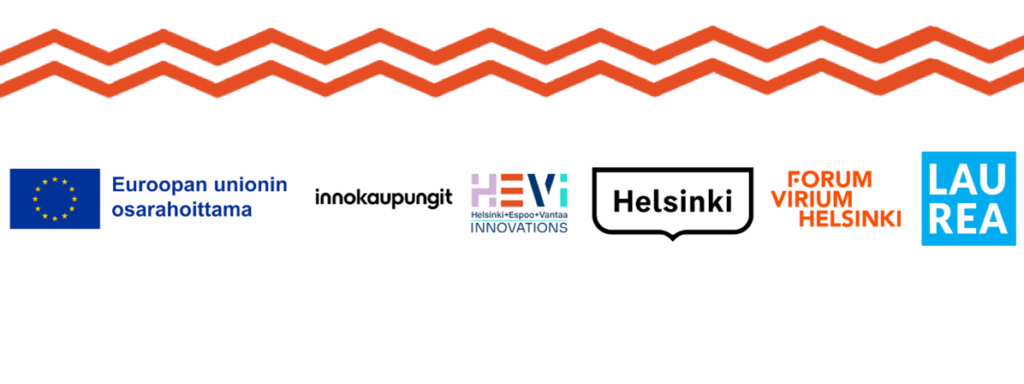This article explores the insights gained from case-examples of cities working on sustainability from an European event regarding the topic and how they can be applied to city-based wellbeing innovation ecosystem development.
 Leveraging Innovation Ecosystems for Wellbeing in Sustainable Cities. Generated with Adobe Firefly.
Leveraging Innovation Ecosystems for Wellbeing in Sustainable Cities. Generated with Adobe Firefly.
One of the goals of the “Urban Environment as Innovation Platform for Wellbeing (KauKo)” (https://hevinnovations.fi/kauko/) project that Laurea is working on with Business Helsinki and Forum Virium Helsinki is to pave way for future collaborations and projects related to the topic . The project has multiple streams of activity that range from enabling companies to use city districts as testbeds for wellbeing innovations to fostering subsequent ecosystemic collaborations regarding the topic. One of the modes of activity we are engaging in to do this is exploring international benchmarks and networking with international partners.
In the KauKo project Laurea coordinates the consortium’s work on wellbeing innovation ecosystems and previously the ecosystem work in Denmark has been of specific interest to us (Seppälä 2024). As a continuation to the benchmarking work I had the opportunity to participate in the EUI Capacity Building Event titled ”Leveraging Innovation Ecosystems for Sustainable Cities” which was held on May 29-30 2024 in Tampere, Finland.
The event organized by the European Urban Initiative (EUI) (https://www.urban-initiative.eu/) aimed to enhance collaboration and foster sustainable urban development across European cities. The primary goals were to share experiences in building thriving innovation ecosystems, strengthening city-to-city cooperation, and exploring strategies that might support the green and digital dual transition. The event featured participants from 26 cities and 4 regions in 11 European countries that engaged in a series of workshops, deep dives, and plenary sessions designed to equip stakeholders working with cities with practical tools and insights to drive sustainable urban development. (EUI 2024.)
Case-examples of state of the art practices
During the event I participated in several impactful sessions that highlighted innovative strategies and collaborative efforts in urban sustainability.
In the panel discussion on “Innovation and Sustainability” Teppo Rantanen from the City of Tampere discussed the city’s bold investments and strategic cooperation between city, university, and businesses. Olli Voutilainen from the Ministry of Economic Affairs and Employment emphasized the need for innovation circulation between cities and countries. Merja Haapakka from the department for regional and urban policy (DG REGIO) of the European Commission elaborated on the EU cohesion policy’s role in promoting innovation and tackling disparities across Europe. (EUI 2024.)
In the Workshop on “Fostering Multi-Level Governance for Innovation”, Fundão, a rural city in Portugal, presented its innovative strategies for smart specialization. The city’s focus on ICT recruitment, quality of life, and educational initiatives has led to significant growth. Highlights included the establishment of a multi-purpose arena for ICT companies, coding academies, and experimental agricultural centers. (EUI 2024.)
In the Deep Dive on “How to Deliver a Local Green Deal”, the city of Mannheim in Germany showcased its Local Green Deal, aiming for climate neutrality by 2030. Key elements included energy transition, sustainable economy, intelligent mobility, and community mobilization. The presentation stressed the importance of stakeholder engagement and innovative structures for collective action. (EUI 2024.)
The Deep Dive on “Developing City-Region Innovation Ecosystems” session focused on fostering collaboration, talent development, innovation-supportive policies, and evaluating ecosystem achievements. Contributions from Bilbao in Spain and Fundão in Portugal provided practical insights into creating and sustaining innovation ecosystems. (EUI 2024.)
The workshop on “Developing an Investment Strategy in Micro-Cities” highlighted the importance of strategic funding and investment for sustainable development in micro-cities. The cities of Ventspils and Valmiera in Latvia shared their experiences and strategies in securing funding and fostering innovation. (EUI 2024.)
Making it Happen: Coordinating Funding for Urban Projects
My favorite talk of the event was titled ”Making it Happen: Driving urban development through strategic innovative actions & funding – Leveraging resources and EU Funds”. In it EUI’s expert Marion Cugnet shared strategies and tools for coordinating and leveraging funding for urban projects. She emphasized the importance of collaboration, strategic planning, and continuous evaluation to achieve the sustainable development goals. (EUI 2024.)
Cugnet highlighted the critical role of stakeholders like community groups, businesses, universities, research organizations, and government bodies. Successful urban development requires continuous monitoring and evaluation, integrating efforts across departments, sharing objectives, and creating opportunities for collaboration to maximize resource impact. (EUI 2024.)
A key theme was optimizing existing resources and leveraging more from the ecosystem. Cugnet asked essential questions about resource management, such as what can be achieved with current resources and how more can be leveraged. Understanding financial needs for capital, revenue, and income-generating projects is crucial. (EUI 2024.)
Cugnet introduced strategic tools to enhance planning and funding efforts, including strategic thematic and funding maps, option appraisal tables, and funding calendars. Different funding types were discussed, such as EU grants, national and regional grants, innovative financing instruments, citizen finance options, green and social investment bonds, guarantee funds, soft loans, revolving funds, and third-party financing. (EUI 2024.)
Identifying key players in the funding landscape is vital. These include the European Commission and its agencies, national and regional government bodies, private sector businesses and investors, philanthropy organizations, financial institutions, and alternative resourcing options. Engaging with these entities helps secure funding and ensure project success. (EUI 2024.)
Successful case studies, like the London electric vehicle pilot and Sharing Cities project, show how local ecosystems can be strengthened through collaboration and networking. These initiatives offer opportunities for cities and regions to partner, share knowledge, and pool resources, enhancing urban development efforts. (EUI 2024.)
Cugnet outlined a structured approach to implementing urban projects in five stages (EUI 2024):
- Preparing for your funding strategy development – Determine financial requirements for capital, revenue, and income generation.
- Mapping Resources – Use strategic thematic and funding maps to align funding opportunities with project goals.
- Conducting a Funding Scan – Research funding opportunities, develop a funding map, assess options regarding strategic/project goals and funding sources.
- Building Your Portfolio – Diversification and/or incremental approach, risk analysis and management, portfolio management and monitoring.
- Funding and Financing Landscape – Understanding types of funding, alternative resourcing options, and key players.
Marion Cugnet’s talk provided a comprehensive guide to how different types of stakeholders might manage the development and funding of urban projects. By fostering collaboration among diverse stakeholders and using strategic tools, cities and their key collaborators can optimize resources and achieve sustainable development goals, enhancing financial viability and ensuring long-term success.
Taking forward the event insights in city-based wellbeing innovation ecosystem development
It has to be acknowledged that in their limited timespans and resources, projects can rarely take the role and functions of ecosystem orchestrators (Seppälä 2023). Instead what we are exploring in regards to ecosystem work in the KauKo project is how a project might help create shared intent, shared understanding and based on them, explore new sources of funding and novel projects.
Especially exploring additional funding in ecosystems is vital as it supports system-level transformations and addresses broader societal challenges. By leveraging collaborative structures and diverse stakeholders, these initiatives can drive long-term strategic efforts that foster innovation and contribute to sustainable growth.
Furthermore, funding can help develop more efficient and attractive system resources, leading to significant economic, social, and environmental impacts. (Wise et al. 2022.)
To support this type of work in the KauKo project we will be organising a series of ecosystem workshops in 2024-2025 targeted to relevant cities and their stakeholders that have an interest in developing new projects related to city-based wellbeing. In the project’s ecosystem workshops, the following topics will be explored:
- identifying shared challenges,
- defining the sub-areas of the overall challenge,
- scanning funding and ideas for subsequent projects, and
- discussing the nature and future of the collaboration.
The insights from the EUI event’s city cases and especially the approach outlined by Cugnet in her talk will be utilised in a suitable manner in the ecosystem work done in the KauKo project.

Writer:
M. Soc. Sci., M. Sci. (Economics), MA (Adult Education), MBA (Service Innovation and Design) Mikael Seppälä is an expert in systemic innovation management and ecosystems orchestration who works as the project manager of the KauKo project at the Laurea University of Applied Sciences.
Sources
- EUI. 2024. Leveraging Innovation Ecosystems for Sustainable Cities: an EUI Capacity Building Event. Accessed: 8.7.2024.
- Seppälä, M. 2023. Sociology and Ecosystems Orchestration – From exploring multiple perspectives to engaging them in sustainability practices. Laurea Journal.
- Seppälä, M. 2024. Miten innovaatioyhteistyötä ja klusterikehittämistä tehdään Tanskassa? Laurea Journal.
- Wise, E., Eklund, M., Smith, M. & Wilson, J. 2022. A participatory approach to tracking system transformation in clusters and innovation ecosystems—Evolving practice in Sweden’s Vinnväxt programme. Research Evaluation, Volume 31, Issue 2, April 2022, Pages 271–287, Accessed 8.7.2024.